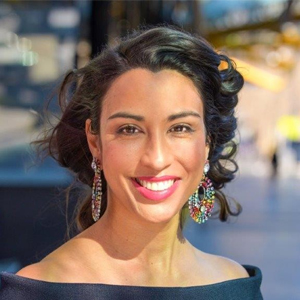Emma Fulu on feminism
Spotlight on Emma Fulu
Source :- ( Partners In Prevention )
Emma is the Founder and Executive Director of The Equality Insitute, a global feminist agency working to end violence against women and girls.
We talked with Emma about her work, the effects of COVID on prevention work, leadership and ‘imposter syndrome’.
Here’s Emma’s story.

I feel like I was born an activist. I come from a family of mixed race and mixed religion. I grew up experiencing a lot of racism and sexism and saw abuse within different parts of my community and family. From when I was a child, I had an intense desire to try and make the world a better place. My parents say I used to walk down the street at age six trying to collect coins for charity from the neighbours.
I did a degree in International Development and Gender Studies. After that, I worked at the Ministry of Gender in the Maldives, did my PhD, and moved to work for the United Nations. After having three children (including a set of twins), while heading up a global program in South Africa, I burnt out very significantly and moved back to Melbourne with my family and started from scratch.
It was while I was unemployed and living with my Mum that I started to think about how I could do this work that I care so much about but in a way that was more nurturing, feminist, intersectional and allowed me to balance my family and work. So, I started the Equality Institute – to create the organisation I wanted to work at.
Gender equality is our area of focus but that does not exist on its own. I fundamentally believe that we can’t achieve gender equality without equality in all other areas. We will all be more effective if we work across social justice spaces. Recognising that we are not experts in Indigenous rights or climate justice or economic justice, but we need to be allies in those movements.
At the Equality Institute, we work across a few different core areas — research, creative communications, learning and policy. We work in Australia and internationally, especially in the Asia-Pacific region.
Some things we’re working on at the minute include leading an impact evaluation of a primary prevention program in Kiribati, a feminist leadership program in Timor Leste, and supporting the Victorian Government with Gender Impact Assessments under the newly established Gender Equality Act. We normally travel a lot, but COVID has changed that. We have been trying to pivot to online learning and thinking about creative ways to use technology. But it has actually been good to pivot – maybe we can have a bigger reach if we can find other ways to do this work.
I have been doing a lot of work in the global funding space, which has been challenged by COVID. Some of the biggest funders have pulled out of PVAWG, which has been very frustrating because at the same time COVID has revealed and exacerbated the existing inequalities in our society. We need fundamental, systemic changes in the ways we think about funding this work. The fact that we are so dependent on a small handful of governments or rich people to fund this work feels highly problematic. I have been speaking to others in the social justice space — Indigenous founders, others coming out of the Black Lives Matter movement — really trying to think a bit more disruptively about what equitable, restorative financing looks like.
We have been doing a lot of work to highlight the impact of COVID – we’ve done infographics with DVRCV and other accessible communications products to raise awareness around the fact that COVID is a gendered issue and that the impact on violence against women is significant.
When I think about transformative leadership and gender justice, it’s not about getting more women CEOs at the table. That would be nice obviously! But the point is actually about transforming cultures and norms. I don’t think leadership has anything to do with your job title. I think people can be transformative feminist leaders in any space they are in – your family, community, sports club, school. You are probably already a leader in your own life.
A lot of people talk about ‘imposter syndrome’ and not feeling good enough. I think that feeling is partly systemic. Unfortunately, the world is designed to make you feel that way. Imposter syndrome is based on the exclusion of certain groups of people from spaces and the invisibility of those people in spaces, so it is inevitable in a patriarchal, white supremacist system for women and people of colour to experience those feelings.
But until we have overthrown the patriarchy, some things that have helped me personally: I don’t think I’m supposed to be perfect. I am very comfortable with failure. It doesn’t define me; it just points me to the next thing and helps me improve. I am very happy to admit that I don’t know what I’m doing but I’m going to give it a go, and I ask for support. Another thing that has helped me is to step back from my own ego. This work is not about me, it is about how I can be of service. That removes some of the pressure. We all have something to offer.
Figure out what is the unique thing you can offer. You are not going to be the best at everything and that’s totally ok.







